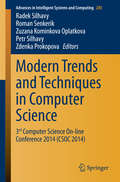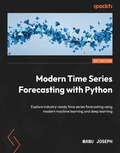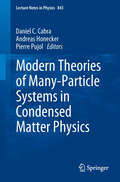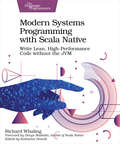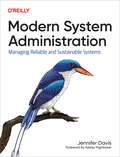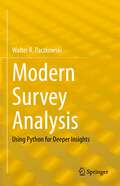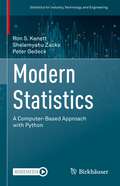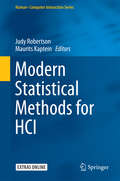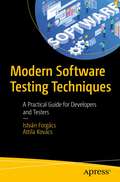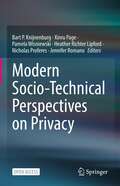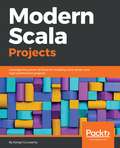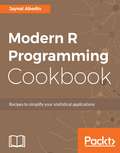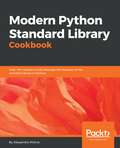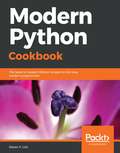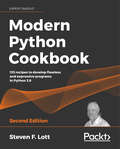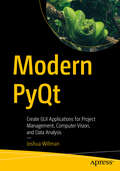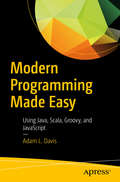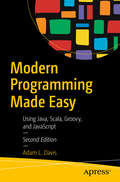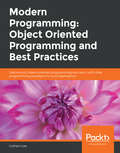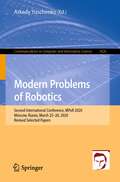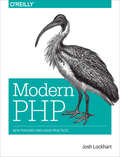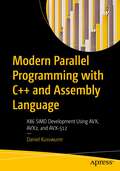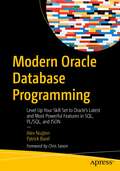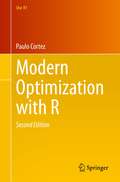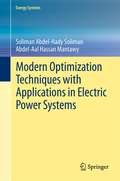- Table View
- List View
Modern Trends and Techniques in Computer Science
by Radek Silhavy Roman Senkerik Zuzana Kominkova Oplatkova Petr Silhavy Zdenka ProkopovaThis book is based on the research papers presented in the 3rd Computer Science On-line Conference 2014 (CSOC 2014). The conference is intended to provide an international forum for discussions on the latest high-quality research results in all areas related to Computer Science. The topics addressed are the theoretical aspects and applications of Artificial Intelligences, Computer Science, Informatics and Software Engineering. The authors provide new approaches and methods to real-world problems, and in particular, exploratory research that describes novel approaches in their field. Particular emphasis is laid on modern trends in selected fields of interest. New algorithms or methods in a variety of fields are also presented. This book is divided into three sections and covers topics including Artificial Intelligence, Computer Science and Software Engineering. Each section consists of new theoretical contributions and applications which can be used for the further development of knowledge of everybody who is looking for new knowledge or new inspiration for further research.
Modern Time Series Forecasting with Python: Explore industry-ready time series forecasting using modern machine learning and deep learning
by Manu JosephBuild real-world time series forecasting systems which scale to millions of time series by applying modern machine learning and deep learning conceptsKey FeaturesExplore industry-tested machine learning techniques used to forecast millions of time seriesGet started with the revolutionary paradigm of global forecasting modelsGet to grips with new concepts by applying them to real-world datasets of energy forecastingBook DescriptionWe live in a serendipitous era where the explosion in the quantum of data collected and a renewed interest in data-driven techniques such as machine learning (ML), has changed the landscape of analytics, and with it, time series forecasting. This book, filled with industry-tested tips and tricks, takes you beyond commonly used classical statistical methods such as ARIMA and introduces to you the latest techniques from the world of ML. This is a comprehensive guide to analyzing, visualizing, and creating state-of-the-art forecasting systems, complete with common topics such as ML and deep learning (DL) as well as rarely touched-upon topics such as global forecasting models, cross-validation strategies, and forecast metrics. You'll begin by exploring the basics of data handling, data visualization, and classical statistical methods before moving on to ML and DL models for time series forecasting. This book takes you on a hands-on journey in which you'll develop state-of-the-art ML (linear regression to gradient-boosted trees) and DL (feed-forward neural networks, LSTMs, and transformers) models on a real-world dataset along with exploring practical topics such as interpretability. By the end of this book, you'll be able to build world-class time series forecasting systems and tackle problems in the real world.What you will learnFind out how to manipulate and visualize time series data like a proSet strong baselines with popular models such as ARIMADiscover how time series forecasting can be cast as regressionEngineer features for machine learning models for forecastingExplore the exciting world of ensembling and stacking modelsGet to grips with the global forecasting paradigmUnderstand and apply state-of-the-art DL models such as N-BEATS and AutoformerExplore multi-step forecasting and cross-validation strategiesWho this book is forThe book is for data scientists, data analysts, machine learning engineers, and Python developers who want to build industry-ready time series models. Since the book explains most concepts from the ground up, basic proficiency in Python is all you need. Prior understanding of machine learning or forecasting will help speed up your learning. For experienced machine learning and forecasting practitioners, this book has a lot to offer in terms of advanced techniques and traversing the latest research frontiers in time series forecasting.
Modern Theories of Many-Particle Systems in Condensed Matter Physics
by Daniel C. Cabra Andreas Honecker Pierre PujolCondensed matter systems where interactions are strong are inherently difficult to analyze theoretically. The situation is particularly interesting in low-dimensional systems, where quantum fluctuations play a crucial role. Here, the development of non-perturbative methods and the study of integrable field theory have facilitated the understanding of the behavior of many quasi one- and two-dimensional strongly correlated systems. In view of the same rapid development that has taken place for both experimental and numerical techniques, as well as the emergence of novel testing-grounds such as cold atoms or graphene, the current understanding of strongly correlated condensed matter systems differs quite considerably from standard textbook presentations. The present volume of lecture notes aims to fill this gap in the literature by providing a collection of authoritative tutorial reviews, covering such topics as quantum phase transitions of antiferromagnets and cuprate-based high-temperature superconductors, electronic liquid crystal phases, graphene physics, dynamical mean field theory applied to strongly correlated systems, transport through quantum dots, quantum information perspectives on many-body physics, frustrated magnetism, statistical mechanics of classical and quantum computational complexity, and integrable methods in statistical field theory. As both graduate-level text and authoritative reference on this topic, this book will benefit newcomers and more experienced researchers in this field alike.
Modern Systems Programming with Scala Native: Write Lean, High-Performance Code without the JVM
by Richard WhalingAccess the power of bare-metal systems programming with Scala Native, an ahead-of-time Scala compiler. Without the baggage of legacy frameworks and virtual machines, Scala Native lets you re-imagine how your programs interact with your operating system. Compile Scala code down to native machine instructions; seamlessly invoke operating system APIs for low-level networking and IO; control pointers, arrays, and other memory management techniques for extreme performance; and enjoy instant start-up times. Skip the JVM and improve your code performance by getting close to the metal. Developers generally build systems on top of the work of those who came before, accumulating layer upon layer of abstraction. Scala Native provides a rare opportunity to remove layers. Without the JVM, Scala Native uses POSIX and ANSI C APIs to build concise, expressive programs that run unusually close to bare metal. Scala Native compiles Scala code down to native machine instructions instead of JVM bytecode. It starts up fast, without the sluggish warm-up phase that's common for just-in-time compilers. Scala Native programs can seamlessly invoke operating system APIs for low-level networking and IO. And Scala Native lets you control pointers, arrays, and other memory layout types for extreme performance. Write practical, bare-metal code with Scala Native, step by step. Understand the foundations of systems programming, including pointers, arrays, strings, and memory management. Use the UNIX socket API to write network client and server programs without the sort of frameworks higher-level languages rely on. Put all the pieces together to design and implement a modern, asynchronous microservice-style HTTP framework from scratch. Take advantage of Scala Native's clean, modern syntax to write lean, high-performance code without the JVM.What You Need:A modern Windows, Mac OS, or Linux system capable of running Docker. All code examples in the book are designed to run on a portable Docker-based build environment that runs anywhere. If you don't have Docker yet, see the Appendix for instructions on how to get it.
Modern System Administration: Managing Reliable And Sustainable Systems
by Jennifer DavisEarly system administration required in-depth knowledge of a variety of services on individual systems. Now, the job is increasingly complex and different from one company to the next with an ever-growing list of technologies and third-party services to integrate. How does any one individual stay relevant in systems and services? This practical guide helps anyone in operations—sysadmins, automation engineers, IT professionals, and site reliability engineers—understand the essential concepts of the role today.Collaboration, automation, and the evolution of systems change the fundamentals of operations work. No matter where you are in your journey, this book provides you the information to craft your path to advancing essential system administration skills. Author Jennifer Davis provides examples of modern practices and tools with recommended materials to advance your skills.Topics include:Development and testing: Version control, fundamentals of virtualization and containers, testing, and architecture reviewDeploying and configuring services: Infrastructure management, networks, security, storage, serverless, and release managementScaling administration: Monitoring and observability, capacity planning, log management and analysis, and security and compliance
Modern Survey Analysis: Using Python for Deeper Insights
by Walter R. PaczkowskiThis book develops survey data analysis tools in Python, to create and analyze cross-tab tables and data visuals, weight data, perform hypothesis tests, and handle special survey questions such as Check-all-that-Apply. In addition, the basics of Bayesian data analysis and its Python implementation are presented. Since surveys are widely used as the primary method to collect data, and ultimately information, on attitudes, interests, and opinions of customers and constituents, these tools are vital for private or public sector policy decisions.As a compact volume, this book uses case studies to illustrate methods of analysis essential for those who work with survey data in either sector. It focuses on two overarching objectives:Demonstrate how to extract actionable, insightful, and useful information from survey data; andIntroduce Python and Pandas for analyzing survey data.
Modern Statistics: A Computer-Based Approach with Python (Statistics for Industry, Technology, and Engineering)
by Ron S. Kenett Shelemyahu Zacks Peter GedeckThis innovative textbook presents material for a course on modern statistics that incorporates Python as a pedagogical and practical resource. Drawing on many years of teaching and conducting research in various applied and industrial settings, the authors have carefully tailored the text to provide an ideal balance of theory and practical applications. Numerous examples and case studies are incorporated throughout, and comprehensive Python applications are illustrated in detail. A custom Python package is available for download, allowing students to reproduce these examples and explore others.The first chapters of the text focus on analyzing variability, probability models, and distribution functions. Next, the authors introduce statistical inference and bootstrapping, and variability in several dimensions and regression models. The text then goes on to cover sampling for estimation of finite population quantities and time series analysis and prediction, concluding with two chapters on modern data analytic methods. Each chapter includes exercises, data sets, and applications to supplement learning.Modern Statistics: A Computer-Based Approach with Python is intended for a one- or two-semester advanced undergraduate or graduate course. Because of the foundational nature of the text, it can be combined with any program requiring data analysis in its curriculum, such as courses on data science, industrial statistics, physical and social sciences, and engineering. Researchers, practitioners, and data scientists will also find it to be a useful resource with the numerous applications and case studies that are included. A second, closely related textbook is titled Industrial Statistics: A Computer-Based Approach with Python. It covers topics such as statistical process control, including multivariate methods, the design of experiments, including computer experiments and reliability methods, including Bayesian reliability. These texts can be used independently or for consecutive courses.The mistat Python package can be accessed at https://gedeck.github.io/mistat-code-solutions/ModernStatistics/"In this book on Modern Statistics, the last two chapters on modern analytic methods contain what is very popular at the moment, especially in Machine Learning, such as classifiers, clustering methods and text analytics. But I also appreciate the previous chapters since I believe that people using machine learning methods should be aware that they rely heavily on statistical ones. I very much appreciate the many worked out cases, based on the longstanding experience of the authors. They are very useful to better understand, and then apply, the methods presented in the book. The use of Python corresponds to the best programming experience nowadays. For all these reasons, I think the book has also a brilliant and impactful future and I commend the authors for that."Professor Fabrizio RuggeriResearch Director at the National Research Council, ItalyPresident of the International Society for Business and Industrial Statistics (ISBIS)Editor-in-Chief of Applied Stochastic Models in Business and Industry (ASMBI)
Modern Statistical Methods for HCI
by Judy Robertson Maurits KapteinThisbook critically reflects on current statistical methods used in Human-ComputerInteraction (HCI) and introduces a number of novel methods to the reader. Coveringmany techniques and approaches for exploratory data analysis including effectand power calculations, experimental design, event history analysis,non-parametric testing and Bayesian inference; the research contained in thisbook discusses how to communicate statistical results fairly, as well aspresenting a general set of recommendations for authors and reviewers toimprove the quality of statistical analysis in HCI. Each chapter presents [R]code for running analyses on HCI examples and explains how the results can beinterpreted. ModernStatistical Methods for HCI is aimed at researchers and graduate students who have someknowledge of "traditional" null hypothesis significance testing, but who wishto improve their practice by using techniques which have recently emerged fromstatistics and related fields. This book critically evaluates current practiceswithin the field and supports a less rigid, procedural view of statistics infavour of fair statistical communication.
Modern Software Testing Techniques: A Practical Guide for Developers and Testers
by István Forgács Attila KovácsMany books have been written about software testing, but most of them discuss the general framework of testing from a traditional perspective. Unfortunately, traditional test design techniques are often ineffective and unreliable for revealing the various kinds of faults that may occur. This book introduces three new software testing techniques: Two-Phase Model-Based Testing, the Action-State Testing, and the General Predicate Testing, all of which work best when applied with efficient fault revealing capabilities. You’ll start with a short recap of software testing, focusing on why risk analysis is obligatory, how to classify bugs practically, and how fault-based testing can be used for improving test design. You’ll then see how action-state testing merges the benefits of state transition testing and use case testing into a unified approach. Moving on you’ll look at general predicate testing and how it serves as an extension of boundary value analysis, encompassing more complex predicates. Two-phase model-based testing represents an advanced approach where the model does not necessarily need to be machine-readable; human readability suffices. The first phase involves a high-level model from which abstract tests are generated. Upon manual execution of these tests, the test code is generated. Rather than calculating output values, they are merely checked for conformity. The last part of this book contains a chapter on how developers and testers can help each other and work as a collaborative team. What You'll LearnApply efficient test design techniques for detecting domain faultsWork with modeling techniques that combine all the advantages of state transition testing and uses case testingGrasp the two-phase model-based testing technique Use test design efficiently to find almost all the bugs in an applicationWho This Book Is ForSoftware developers, QA engineers, and, business analysts
Modern Socio-Technical Perspectives on Privacy
by Nicholas Proferes Bart P. Knijnenburg Xinru Page Pamela Wisniewski Heather Richter Lipford Jennifer RomanoThis open access book provides researchers and professionals with a foundational understanding of online privacy as well as insight into the socio-technical privacy issues that are most pertinent to modern information systems, covering several modern topics (e.g., privacy in social media, IoT) and underexplored areas (e.g., privacy accessibility, privacy for vulnerable populations, cross-cultural privacy). The book is structured in four parts, which follow after an introduction to privacy on both a technical and social level: Privacy Theory and Methods covers a range of theoretical lenses through which one can view the concept of privacy. The chapters in this part relate to modern privacy phenomena, thus emphasizing its relevance to our digital, networked lives. Next, Domains covers a number of areas in which privacy concerns and implications are particularly salient, including among others social media, healthcare, smart cities, wearable IT, and trackers. The Audiences section then highlights audiences that have traditionally been ignored when creating privacy-preserving experiences: people from other (non-Western) cultures, people with accessibility needs, adolescents, and people who are underrepresented in terms of their race, class, gender or sexual identity, religion or some combination. Finally, the chapters in Moving Forward outline approaches to privacy that move beyond one-size-fits-all solutions, explore ethical considerations, and describe the regulatory landscape that governs privacy through laws and policies. Perhaps even more so than the other chapters in this book, these chapters are forward-looking by using current personalized, ethical and legal approaches as a starting point for re-conceptualizations of privacy to serve the modern technological landscape. The book’s primary goal is to inform IT students, researchers, and professionals about both the fundamentals of online privacy and the issues that are most pertinent to modern information systems. Lecturers or teachers can assign (parts of) the book for a “professional issues” course. IT professionals may select chapters covering domains and audiences relevant to their field of work, as well as the Moving Forward chapters that cover ethical and legal aspects. Academics who are interested in studying privacy or privacy-related topics will find a broad introduction in both technical and social aspects.
Modern Scala Projects: Leverage the power of Scala for building data-driven and high-performant projects
by Ilango GurusamyDevelop robust, Scala-powered projects with the help of machine learning libraries such as SparkML to harvest meaningful insightKey FeaturesGain hands-on experience in building data science projects with Scala Exploit powerful functionalities of machine learning librariesUse machine learning algorithms and decision tree models for enterprise appsBook DescriptionScala, together with the Spark Framework, forms a rich and powerful data processing ecosystem. Modern Scala Projects is a journey into the depths of this ecosystem. The machine learning (ML) projects presented in this book enable you to create practical, robust data analytics solutions, with an emphasis on automating data workflows with the Spark ML pipeline API. This book showcases or carefully cherry-picks from Scala’s functional libraries and other constructs to help readers roll out their own scalable data processing frameworks. The projects in this book enable data practitioners across all industries gain insights into data that will help organizations have strategic and competitive advantage. Modern Scala Projects focuses on the application of supervisory learning ML techniques that classify data and make predictions. You'll begin with working on a project to predict a class of flower by implementing a simple machine learning model. Next, you'll create a cancer diagnosis classification pipeline, followed by projects delving into stock price prediction, spam filtering, fraud detection, and a recommendation engine. By the end of this book, you will be able to build efficient data science projects that fulfil your software requirements.What you will learnCreate pipelines to extract data or analytics and visualizationsAutomate your process pipeline with jobs that are reproducible Extract intelligent data efficiently from large, disparate datasets Automate the extraction, transformation, and loading of dataDevelop tools that collate, model, and analyze dataMaintain the integrity of data as data flows become more complexDevelop tools that predict outcomes based on “pattern discovery”Build really fast and accurate machine-learning models in ScalaWho this book is forModern Scala Projects is for Scala developers who would like to gain some hands-on experience with some interesting real-world projects. Prior programming experience with Scala is necessary.
Modern R Programming Cookbook
by Jaynal AbedinRecipes for emerging developers in R programming and data scientists to simplify their R programming capabilities About This Book • Develop strategies to speed up your R code • Tackle programming problems and explore both functional and object-oriented programming techniques • Learn how to address the core problems of programming in R with the most popular R packages for common tasks Who This Book Is For This book is for developers who would like to enhance the R programming skills. Basic knowledge of R programming is assumed. What You Will Learn • Install R and its various IDE for a given platform along with installing libraries from different repositories and version control • Learn about basic data structures in R and how to work with them • Write customized R functions and handle recursions, exceptions in R environments • Create the data processing task as a step by step computer program and execute using dplyr • Extract and process unstructured text data • Interact with database management system to develop statistical applications • Formulate and implement parallel processing in R In Detail R is a powerful tool for statistics, graphics, and statistical programming. It is used by tens of thousands of people daily to perform serious statistical analyses. It is a free, open source system whose implementation is the collective accomplishment of many intelligent, hard-working people. There are more than 2,000 available add-ons, and R is a serious rival to all commercial statistical packages. The objective of this book is to show how to work with different programming aspects of R. The emerging R developers and data science could have very good programming knowledge but might have limited understanding about R syntax and semantics. Our book will be a platform develop practical solution out of real world problem in scalable fashion and with very good understanding. You will work with various versions of R libraries that are essential for scalable data science solutions. You will learn to work with Input / Output issues when working with relatively larger dataset. At the end of this book readers will also learn how to work with databases from within R and also what and how meta programming helps in developing applications. Style and approach This book will be a companion for R programmer and emerging developers in R programming areas. This book will contain recipes related to advanced R programming which will enable users to solve complex problems efficiently.
Modern Python Standard Library Cookbook: Over 100 recipes to fully leverage the features of the standard library in Python
by Alessandro MolinaBuild optimized applications in Python by smartly implementing the standard libraryKey FeaturesStrategic recipes for effective application development in PythonTechniques to create GUIs and implement security through cryptographyBest practices for developing readily scalable, production-ready applicationsBook DescriptionThe Python 3 Standard Library is a vast array of modules that you can use for developing various kinds of applications. It contains an exhaustive list of libraries, and this book will help you choose the best one to address specific programming problems in Python.The Modern Python Standard Library Cookbook begins with recipes on containers and data structures and guides you in performing effective text management in Python. You will find Python recipes for command-line operations, networking, filesystems and directories, and concurrent execution. You will learn about Python security essentials in Python and get to grips with various development tools for debugging, benchmarking, inspection, error reporting, and tracing. The book includes recipes to help you create graphical user interfaces for your application. You will learn to work with multimedia components and perform mathematical operations on date and time. The recipes will also show you how to deploy different searching and sorting algorithms on your data.By the end of the book, you will have acquired the skills needed to write clean code in Python and develop applications that meet your needs.What you will learnStore multiple values per key in associative containersCreate interactive character-based user interfacesWork with native time and display data for your time zoneRead/write SGML family languages, both as a SAX and DOM parser to meet file sizes and other requirementsGroup equivalent items using itertools and sorted features togetherUse partials to create unary functions out of multi-argument functionsImplement hashing algorithms to store passwords in a safe wayWho this book is forIf you are a developer who wants to write highly responsive, manageable, scalable, and resilient code in Python, this book is for you. Prior programming knowledge in Python will help you make the most out of the book.
Modern Python Cookbook
by Steven F. LottThe latest in modern Python recipes for the busy modern programmer About This Book * Develop succinct, expressive programs in Python * Learn the best practices and common idioms through carefully explained and structured recipes * Discover new ways to apply Python for the new age of development Who This Book Is For The book is for web developers, programmers, enterprise programmers, engineers, big data scientist, and so on. If you are a beginner, Python Cookbook will get you started. If you are experienced, it will expand your knowledge base. A basic knowledge of programming would help. What You Will Learn * See the intricate details of the Python syntax and how to use it to your advantage * Improve your code readability through functions in Python * Manipulate data effectively using built-in data structures * Get acquainted with advanced programming techniques in Python * Equip yourself with functional and statistical programming features * Write proper tests to be sure a program works as advertised * Integrate application software using Python In Detail Python is the preferred choice of developers, engineers, data scientists, and hobbyists everywhere. It is a great scripting language that can power your applications and provide great speed, safety, and scalability. By exposing Python as a series of simple recipes, you can gain insight into specific language features in a particular context. Having a tangible context helps make the language or standard library feature easier to understand. This book comes with over 100 recipes on the latest version of Python. The recipes will benefit everyone ranging from beginner to an expert. The book is broken down into 13 chapters that build from simple language concepts to more complex applications of the language. The recipes will touch upon all the necessary Python concepts related to data structures, OOP, functional programming, as well as statistical programming. You will get acquainted with the nuances of Python syntax and how to effectively use the advantages that it offers. You will end the book equipped with the knowledge of testing, web services, and configuration and application integration tips and tricks. The recipes take a problem-solution approach to resolve issues commonly faced by Python programmers across the globe. You will be armed with the knowledge of creating applications with flexible logging, powerful configuration, and command-line options, automated unit tests, and good documentation. Style and approach This book takes a recipe-based approach, where each recipe addresses specific problems and issues. The recipes provide discussions and insights and an explanation of the problems.
Modern Python Cookbook: 133 recipes to develop flawless and expressive programs in Python 3.8, 2nd Edition
by Steven F. LottComplete recipes spread across 15 chapters to help you overcome commonly faced issues by Python for everybody across the globe. Each recipe takes a problem-solution approach to resolve for effective Python. Key Features Develop expressive and effective Python programs Best practices and common idioms through carefully explained recipes Discover new ways to apply Python for data-focused development Make use of Python's optional type annotations Book Description Python is the preferred choice of developers, engineers, data scientists, and hobbyists everywhere. It is a great language that can power your applications and provide great speed, safety, and scalability. It can be used for simple scripting or sophisticated web applications. By exposing Python as a series of simple recipes, this book gives you insight into specific language features in a particular context. Having a tangible context helps make the language or a given standard library feature easier to understand. This book comes with 133 recipes on the latest version of Python 3.8. The recipes will benefit everyone, from beginners just starting out with Python to experts. You'll not only learn Python programming concepts but also how to build complex applications. The recipes will touch upon all necessary Python concepts related to data structures, object oriented programming, functional programming, and statistical programming. You will get acquainted with the nuances of Python syntax and how to effectively take advantage of it. By the end of this Python book, you will be equipped with knowledge of testing, web services, configuration, and application integration tips and tricks. You will be armed with the knowledge of how to create applications with flexible logging, powerful configuration, command-line options, automated unit tests, and good documentation. What you will learn See the intricate details of the Python syntax and how to use it to your advantage Improve your coding with Python readability through functions Manipulate data effectively using built-in data structures Get acquainted with advanced programming techniques in Python Equip yourself with functional and statistical programming features Write proper tests to be sure a program works as advertised Integrate application software using Python Who this book is for The Python book is for web developers, programmers, enterprise programmers, engineers, and big data scientists. If you are a beginner, this book will get you started. If you are experienced, it will expand your knowledge base. A basic knowledge of programming would help.
Modern PyQt: Create GUI Applications for Project Management, Computer Vision, and Data Analysis
by Joshua WillmanDive into GUI application development and create useful applications for practical and relevant topics in the fields of business, computer science, and research. This book uses a realistic approach to help get you started designing and building the applications you need while learning new tools along the way. PyQt has a vast collection of tools that you can use to create GUIs, many of which seem to go unexplored. In Modern PyQt, you will go beyond some of the fundamental topics of GUI development in order to begin building useful desktop applications. Through extensive examples and hands-on projects, you will explore how to make applications for data analysis and visualization using graphs, computer vision with OpenCV and PyQt, the basics of networking, handling databases with SQL, and more! Whether you are looking for new ideas to practice your skills as a programmer or you have a specific goal in mind and need some help to get your ideas off the ground, there is something in Modern PyQt for you!What You Will LearnCreate cross-platform GUIs with Python and PyQt.Understand the important PyQt classes, widgets, and concepts needed for building interactive and practical applications. Find out how to embed useful Python modules into your applications to create more advanced GUIs. Build useful applications that you can improve or make into something completely new with Python and PyQt. Who This Book Is ForIntermediate level programmers or above in Python. GUI developers with some experience designing GUIs. Even if they have never used PyQt before, the concepts learned from other toolkits, such as Tkinter or wxPython, can be carried over for developing applications with using PyQt.
Modern Programming Made Easy
by Adam L. DavisGet up and running fast with the basics of programming using Java as an example language. This short book gets you thinking like a programmer in an easy and entertaining way. Modern Programming Made Easy teaches you basic coding principles, including working with lists, sets, arrays, and maps; coding in the object-oriented style; and writing a web application. This book is language agnostic, but will mainly cover Java, with some references to Groovy, Scala, and JavaScript to give you a broad range of examples to consider. You will get a taste of what modern programming has to offer and set yourself up for further study and growth in your chosen language. What You'll Learn Code using the functional programming style Build and test your code Read and write from files Design user interfaces Deploy your app in the cloud Who This Book Is For Anyone who wants to learn how to code. Whether you're a student, a teacher, looking for a career change, or just a hobbyist, this book is made for you.
Modern Programming Made Easy: Using Java, Scala, Groovy, and JavaScript
by Adam L. DavisGet up and running fast with the basics of programming using Java as an example language. This short book gets you thinking like a programmer in an easy and entertaining way. Modern Programming Made Easy teaches you basic coding principles, including working with lists, sets, arrays, and maps; coding in the object-oriented style; and writing a web application. This book is largely language agnostic, but mainly covers the latest appropriate and relevant release of Java, with some updated references to Groovy, Scala, and JavaScript to give you a broad range of examples to consider. You will get a taste of what modern programming has to offer and set yourself up for further study and growth in your chosen language. What You'll Learn Write code using the functional programming style Build your code using the latest releases of Java, Groovy, and more Test your code Read and write from files Design user interfaces Deploy your app in the cloud Who This Book Is For Anyone who wants to learn how to code. Whether you're a student, a teacher, looking for a career change, or just a hobbyist, this book is made for you.
Modern Programming: Deconstruct object-oriented programming and use it with other programming paradigms to build applications
by Graham LeeDiscover the untapped features of object-oriented programming and use it with other software tools to code fast, efficient applications. Key Features Explore the complexities of object-oriented programming (OOP) Discover what OOP can do for you Learn to use the key tools and software engineering practices to support your own programming needs Book Description Your experience and knowledge always influence the approach you take and the tools you use to write your programs. With a sound understanding of how to approach your goal and what software paradigms to use, you can create high-performing applications quickly and efficiently. In this two-part book, you'll discover the untapped features of object-oriented programming and use it with other software tools to code fast and efficient applications. The first part of the book begins with a discussion on how OOP is used today and moves on to analyze the ideas and problems that OOP doesn't address. It continues by deconstructing the complexity of OOP, showing you its fundamentally simple core. You'll see that, by using the distinctive elements of OOP, you can learn to build your applications more easily. The next part of this book talks about acquiring the skills to become a better programmer. You'll get an overview of how various tools, such as version control and build management, help make your life easier. This book also discusses the pros and cons of other programming paradigms, such as aspect-oriented programming and functional programming, and helps to select the correct approach for your projects. It ends by talking about the philosophy behind designing software and what it means to be a "good" developer. By the end of this two-part book, you will have learned that OOP is not always complex, and you will know how you can evolve into a better programmer by learning about ethics, teamwork, and documentation. What you will learn Untangle the complexity of object-oriented programming by breaking it down to its essential building blocks Realize the full potential of OOP to design efficient, maintainable programs Utilize coding best practices, including TDD, pair programming and code reviews, to improve your work Use tools, such as source control and IDEs, to work more efficiently Learn how to most productively work with other developers Build your own software development philosophy Who this book is for This book is ideal for programmers who want to understand the philosophy behind creating software and what it means to be “good” at designing software. Programmers who want to deconstruct the OOP paradigm and see how it can be reconstructed in a clear, straightforward way will also find this book useful. To understand the ideas expressed in this book, you must be an experienced programmer who wants to evolve their practice.
Modern Problems of Robotics: Second International Conference, MPoR 2020, Moscow, Russia, March 25–26, 2020, Revised Selected Papers (Communications in Computer and Information Science #1426)
by Arkady YuschenkoThis book constitutes the post-conference proceedings of the 2nd International Conference on Modern Problems of Robotics, MPoR 2020, held in Moscow, Russia, in March 2020.The 16 revised full papers were carefully reviewed and selected from 21 submissions. The volume includes the following topical sections: Collaborative Robotic Systems, Robotic Systems Design and Simulation, and Robots Control. The papers are devoted to the most interesting today’s investigations in Robotics, such as the problems of the human–robot interaction, the problems of robot design and simulation, and the problems of robot and robotic complexes control.
Modern PHP
by Josh LockhartPHP is experiencing a renaissance, though it may be difficult to tell with all of the outdated PHP tutorials online. With this practical guide, you'll learn how PHP has become a full-featured, mature language with object-orientation, namespaces, and a growing collection of reusable component libraries.Author Josh Lockhart--creator of PHP The Right Way, a popular initiative to encourage PHP best practices--reveals these new language features in action. You'll learn best practices for application architecture and planning, databases, security, testing, debugging, and deployment. If you have a basic understanding of PHP and want to bolster your skills, this is your book.Learn modern PHP features, such as namespaces, traits, generators, and closuresDiscover how to find, use, and create PHP componentsFollow best practices for application security, working with databases, errors and exceptions, and moreLearn tools and techniques for deploying, tuning, testing, and profiling your PHP applicationsExplore Facebook's HVVM and Hack language implementations--and how they affect modern PHPBuild a local development environment that closely matches your production server
Modern Parallel Programming with C++ and Assembly Language: X86 SIMD Development Using AVX, AVX2, and AVX-512
by Daniel KusswurmLearn the fundamentals of x86 Single instruction multiple data (SIMD) programming using C++ intrinsic functions and x86-64 assembly language. This book emphasizes x86 SIMD programming topics and technologies that are relevant to modern software development in applications which can exploit data level parallelism, important for the processing of big data, large batches of data and related important in data science and much more. Modern Parallel Programming with C++ and Assembly Language is an instructional text that explains x86 SIMD programming using both C++ and assembly language. The book’s content and organization are designed to help you quickly understand and exploit the SIMD capabilities of x86 processors. It also contains an abundance of source code that is structured to accelerate learning and comprehension of essential SIMD programming concepts and algorithms. After reading this book, you will be able to code performance-optimized AVX, AVX2, and AVX-512 algorithms using either C++ intrinsic functions or x86-64 assembly language. What You Will Learn Understand the essential details about x86 SIMD architectures and instruction sets including AVX, AVX2, and AVX-512.Master x86 SIMD data types, arithmetic instructions, and data management operations using both integer and floating-point operands.Code performance-enhancing functions and algorithms that fully exploit the SIMD capabilities of a modern x86 processor.Employ C++ intrinsic functions and x86-64 assembly language code to carry out arithmetic calculations using common programming constructs including arrays, matrices, and user-defined data structures.Harness the x86 SIMD instruction sets to significantly accelerate the performance of computationally intense algorithms in applications such as machine learning, image processing, computer graphics, statistics, and matrix arithmetic.Apply leading-edge coding strategies and techniques to optimally exploit the x86 SIMD instruction sets for maximum possible performance. Who This Book Is For Intermediate to advanced programmers/developers in general. Readers of this book should have previous programming experience with modern C++ (i.e., ANSI C++11 or later) and Assembly. Some familiarity with Microsoft’s Visual Studio or the GNU toolchain will be helpful. The target audience for Modern X86 SIMD Programming are experienced software developers, programmers and maybe some hobbyists.
Modern Oracle Database Programming: Level Up Your Skill Set to Oracle's Latest and Most Powerful Features in SQL, PL/SQL, and JSON
by Alex Nuijten Patrick BarelLevel up your skill set to the latest that Oracle Database can offer. This book introduces features that are not well known that can transform your development efforts. You’ll discover built-in functionality that can save you massive amounts of time that otherwise would be spent reinventing the wheel. You’ll find that what used to take a lot of programming some years ago can be done with less code in a more reliable way today. Anyone using Oracle Database without the knowledge in this book is leaving valuable functionality–that their company has paid for–on the table, and this book opens the door to that functionality so that you can deliver reliable and performant solutions faster and more easily than ever.Part I looks at features in SQL and PL/SQL that are underused and not well known. You’ll learn about new join types, pattern matching across rows, Top N pagination (useful in reporting!), qualified expressions, and enhancements to iterators that reduce code complexity and make your logic easier to understand.Part II covers how and when to invoke PL/SQL from SQL while maintaining performance. You'll learn about SQL macro functions for creating reusable SQL fragments, polymorphic table functions with return types determined by incoming argument types, and constructing and parsing JSON documents for data interchange with other systems.Part III introduces a vast array of built-in functionality that Oracle provides that is just waiting to be used. Edition-based redefinition enables zero-downtime application and schema upgrades. Data redaction enables easier compliance with privacy laws and similar regulations by protecting sensitive data from those who have no need to see it. Virtual private databases provide the appearance of giving each user their own database, again helping to secure sensitive data. These features are just a taste of what the book provides. Soon you’ll be improving your skills and wondering why you ever worked so hard to solve problems that Oracle Database already solves for you.What You Will LearnWrite more powerful code by incorporating underused features in SQL and PL/SQLOptimize your integration between SQL and PL/SQL for best performanceTake advantage of enhanced set operators, lateral joins, row-based pattern matching, and other advanced features in SQLMake your code easier to understand through your use of newer PL/SQL features, such as qualified expressions and iterator enhancementsIntegrate with web services and external data sources directly from the databaseCreate and parse JSON documents for easy data exchange and flexible schema designWho This Book Is ForAny developer who is writing SQL or PL/SQL, PL/SQL experts who want to level up their knowledge and skills to the latest features that Oracle Database provides, and developers who don’t want to write their own solutions only to find out later that they’ve wasted their time by building something that Oracle Database provides out of the box
Modern Optimization with R (Use R!)
by Paulo CortezThe goal of this book is to gather in a single work the most relevant concepts related in optimization methods, showing how such theories and methods can be addressed using the open source, multi-platform R tool. Modern optimization methods, also known as metaheuristics, are particularly useful for solving complex problems for which no specialized optimization algorithm has been developed. These methods often yield high quality solutions with a more reasonable use of computational resources (e.g. memory and processing effort). Examples of popular modern methods discussed in this book are: simulated annealing; tabu search; genetic algorithms; differential evolution; and particle swarm optimization. This book is suitable for undergraduate and graduate students in computer science, information technology, and related areas, as well as data analysts interested in exploring modern optimization methods using R.This new edition integrates the latest R packages through text and code examples. It also discusses new topics, such as: the impact of artificial intelligence and business analytics in modern optimization tasks; the creation of interactive Web applications; usage of parallel computing; and more modern optimization algorithms (e.g., iterated racing, ant colony optimization, grammatical evolution).
Modern Optimization Techniques with Applications in Electric Power Systems
by Abdel-Aal Hassan Mantawy Soliman Abdel-Hady SolimanThis book presents the application of some AI related optimization techniques in the operation and control of electric power systems. With practical applications and examples the use of functional analysis, simulated annealing, Tabu-search, Genetic algorithms and fuzzy systems for the optimization of power systems is discussed in detail. Preliminary mathematical concepts are presented before moving to more advanced material. Researchers and graduate students will benefit from this book. Engineers working in utility companies, operations and control, and resource management will also find this book useful.
